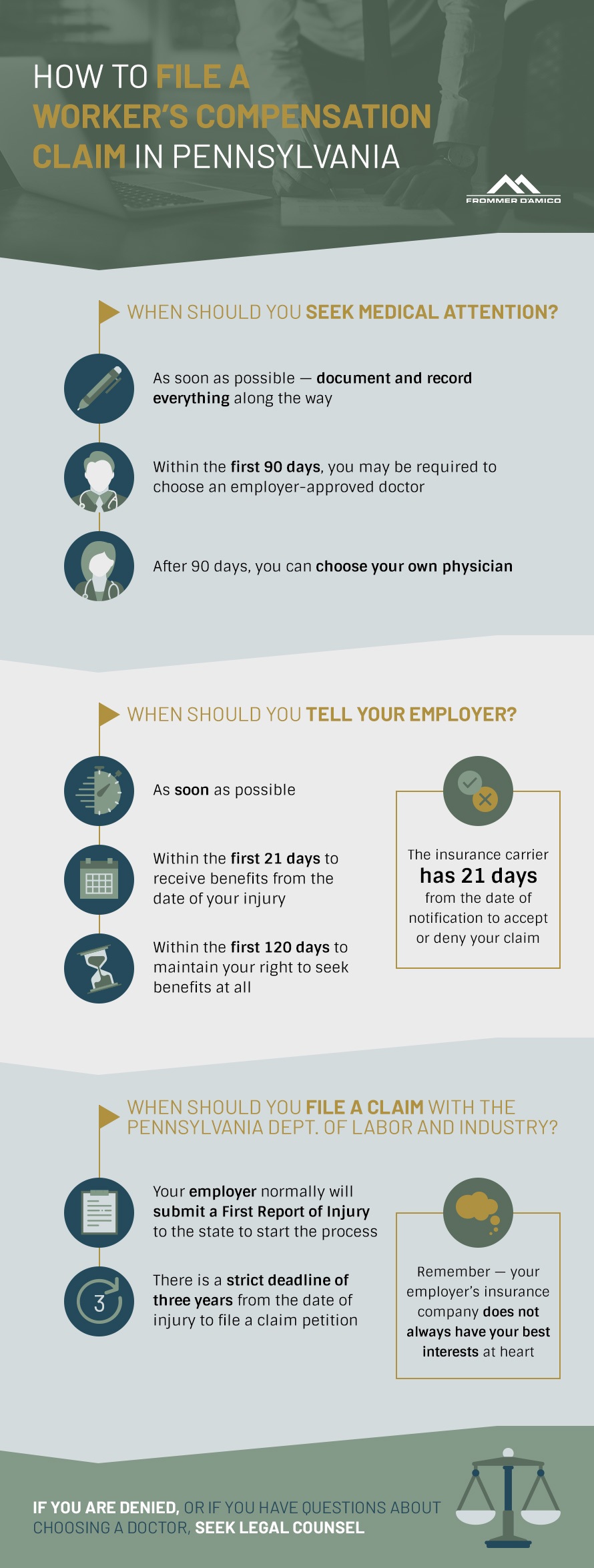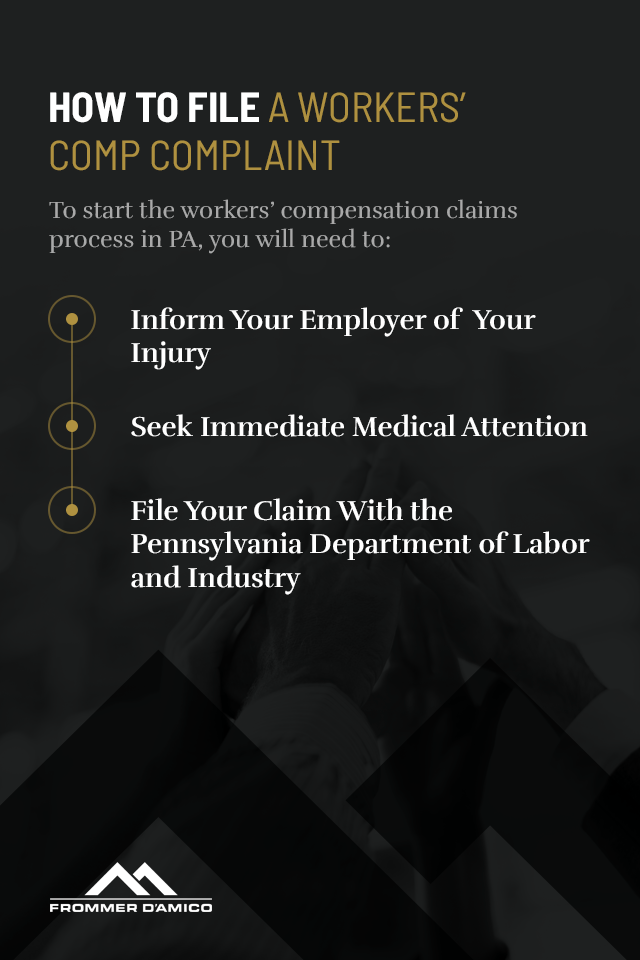Table of Contents
Each state has its own guidelines about how employees should file workers’ compensation claims. If you’ve been injured at work in Pennsylvania, there are several things you need to know about filing a workers’ compensation claim. In this guide, we’ll discuss what a workers’ compensation claim is, when and how to file one and how the process works.
Understanding PA Workers’ Compensation Claims
Workers’ compensation is meant to protect you in case you are injured in the workplace. These benefits allow you to have some income and pay medical bills, among other benefits. With the Pennsylvania workers’ compensation system, employers pay for the insurance, and in the case of a workplace injury, eligible workers are supposed to get workers’ comp benefits, regardless of fault in the injury.
Many workers who have been injured in Pennsylvania have questions about filing for worker’s compensation. The PA workers’ compensation claims process was created to help workers, but you are more likely to improve your chances of securing benefits if you understand how it works.
It can also be useful to speak to a workers’ compensation attorney if you have any concerns and would like personalized legal advice.
Infographic – Filing a Workers Comp Claim
When to File a Workers’ Comp Complaint
Timing is important. You will start the Pennsylvania workers’ compensation process by reporting your injury or work-related illness to your employer. In Pennsylvania, you must do this within 120 days of sustaining your injury or falling ill. If you wait longer, you may lose the right to seek workers’ comp benefits.
Although 120 days may seem like plenty of time to file your claim, you will want to inform your employer as soon as you are able. Delays can increase the risk of challenges to your claim, and waiting can hurt your case.
How to File a Workers’ Compensation Claim in PA
To start the workers’ compensation claims process in PA, you will need to:
Video – How to File a Workers’ Comp Compensation Claim
1. Inform Your Employer of Your Injury
Within 120 days of your injury or illness, you will need to tell your employer you have suffered a work-related illness or injury. Ideally, you will want to report your injury sooner than this deadline. If you report your injury within the first 21 days of sustaining your injury, you can receive your benefits from the date you were injured. Waiting until after the first 21 days will mean you’ll instead receive your benefits from the date you made the report of your injury.
2. Seek Immediate Medical Attention
As soon as possible, visit a doctor about your illness or injury. When seeking medical attention, be sure to mention that the injury was job-related, so the process of documentation can start. Within the first 90 days, you may be required to choose an employer-approved doctor from a list provided by your employer. Outside of these 90 days, you can choose your own physician.
Medical records are an important part of the evidence presented in the workers’ compensation claims process in Pennsylvania, so it is important to seek medical attention. Even if you are not sure you are injured, seeking a medical opinion can ensure you get the treatment you need as well as a professional diagnosis of your condition. Prompt medical attention can also mean you get the appropriate treatment, which can help you avoid medical complications and pain.
3. File Your Claim With the Pennsylvania Department of Labor and Industry
The third step in the Pennsylvania workers’ compensation claims process is to file a claim with the Pennsylvania Department of Labor and Industry. Your employer must submit a First Report of Injury to the state to start the process. If your Employer denies your claim or fails to act, there is a strict deadline of three years from the date of injury to file a claim petition to ensure you do not lose your rights to benefits.
4. Fill Out All the Required Workers’ Compensation Claim Forms
After your report your injury to a supervisor, your Employer should file a form with the Pennsylvania Workers’ Comp Bureau called a First Report of Injury. Your employer or their insurance company may submit additional forms to the Pennsylvania Workers’ Comp Bureau.
Here are some of the forms that Employers commonly file:
- LIBC-494C: The Statement of Wages, for injuries that occurred on or after June 24, 1996.
- LIBC-495: Notice of Compensation Payable.
- LIBC-336: The Agreement for Compensation for Disability or Permanent Injury.
- LIBC-501: Notice of Temporary Compensation Payable.
- LIBC-337: The Supplemental Agreement for Compensation for Disability or Permanent Injury.
- LIBC-496: Notice of Denial
- LIBC-502: Notice Stopping Temporary Compensation.
Do You Need Help With the Workers’ Compensation Claims Process?
Let the experienced attorneys at Frommer D’Amico help you with your workers’ compensation claim. Knowing the timeline of a workers’ compensation case is important for an injured worker to ensure they receive the benefits for which they are eligible.
If you feel your employer and its insurance company handled your claim improperly, our firm of knowledgeable and experienced attorneys can assist you. We deal only with workers’ compensation cases. We are familiar with the ins and outs of the compensation system and know the tricks insurance companies will try to play in order to prevent you from getting the benefits you are entitled to receive.
We offer a free initial consultation and free case management if you decide to work with us. You can contact us at 717-400-1000. Or get in touch by passing on your contact information and some details about your situation. A member of our team will get back to you as soon as possible.
You’ll also get:
- Convenient access to your attorney. Your attorney can talk to you at night, over the weekend or in your home — wherever it is convenient for you.
- Cost-effective representation. Review our contingency agreement and you’ll find that we provide free case management services. We also don’t charge for depositions, transcripts, medical or doctor records.
- Your questions answered — fast. Avoid frustrating delays and skip leaving unanswered messages with secretaries. You’ll get the detail-oriented representation you deserve.
You don’t have to navigate this difficult and frustrating situation alone. Our attorneys can walk you through each step.
The Timeline of a Workers’ Compensation Claim
If you’ve been injured on the job in Pennsylvania, you may be eligible to receive workers’ compensation benefits. In order to receive these benefits, you need to understand the timeline that’s involved, such as when to file a workers’ compensation claim by. There are seven major steps in this process. While you must report the injury within the timeframe outlined above, it can take much longer for every piece of the claim to play out. You could be waiting for months to see the money you are entitled to.
Follow the steps outlined in this workers’ compensation claim timeline exactly to have the best chance of getting your money.
1. Report Your Injury
You will face a lot of deadlines during your workers’ compensation claim journey, and the first is informing your employer of your injury. This should happen within 120 days of its occurrence, according to PA laws, though the sooner you report, the better.
Notifying your employer may work a bit differently depending on where you work. You should talk to your human resources department if you are not certain of the correct procedure. They can advise you on workers’ compensation claim time limits and tell you how to formally inform your employer of the injury. Remember that it is always OK to ask more questions of HR. You want this to go as smoothly as possible, and they likely have experience with past cases that can help inform you of best practices.
2. File a Workers’ Compensation Claim With the State
After you have notified your employer of your injury, you have up to three years from the date of the injury to file a claim petition with the Workers’ Compensation Bureau. Remember, the three-year period starts when you first know about the injury.
In some cases, such as a broken leg or arm caused by a slip in the workplace, the injuries are obvious immediately. But other work-related injuries can take days or weeks to manifest themselves. In the case of an injury like carpal tunnel syndrome or any other repetitive stress injury, you may not be aware of the injury for several months or even years.
When you realize you have suffered a work-related injury and have notified your employer as soon as it becomes known to you, that is when the three-year period to make a claim starts. If you do not make a claim within the three-year timeframe, then you will lose your eligibility for workers’ compensation benefits.
There are a few exceptions to this rule that you should know:
- If you have suffered a loss of hearing from long-term exposure to loud noise, you need to bring the claim within three years of the last time you are exposed to that loud noise.
- If you have contracted a work-related occupational disease from exposure to a toxin or a hazard, you need to be suffering from a related workplace illness that results from this exposure within 300 weeks (just over five and a half years) from the time you were last exposed to the toxin. Then the 120-day employee notice, three-year window to file a claim with the state exam begins.
- If you received some compensation from your employer for your work-related injury but it stopped before you recovered, you may have three years following the last payment to file a claim with the state.
- The time window may also be extended if your employer has deceived you into thinking they have accepted your claim. If this happens, the first thing you should do is check with a workers’ compensation attorney in Pennsylvania.
3. Seek Medical Care
If you have suffered a work-related injury, one of the best things you can do to help your recovery and provide evidence if you file a workers’ compensation claim is to seek medical care.
Some businesses will have a health care provider on staff, such as a nurse. If you are injured and able to walk, then you should see them immediately and notify them that you have been injured during work hours. In some cases, injuries are severe enough that you will be transported to a hospital’s emergency room. If you are able, notify the doctor and any other medical providers you see that you were injured on the job.
If you get injured at work but you don’t start to feel pain for the first couple of days after the injury, see your doctor as soon as you feel pain or discomfort. Make sure you tell them you were injured on the job and how the injury occurred.
The reason for doing this is twofold:
- If you have been injured, you need to receive medical care as soon as possible. Work-related injuries can take many months to heal. If you wait to see a doctor, it may not only delay the healing process but also you may miss the 120-day window to notify your employer that you have been injured.
- Seeking medical care as soon as you are injured also helps your workers’ comp claim. If you delay seeking medical care, your employer’s insurance company may argue that you’re not hurt as badly as you say you are. Even if you have notified your employer of the injury within the proper time frame but have not sought medical care, this can also be used by the insurance company to argue that you are not really hurt.
Seeking medical care as soon as possible begins the process of compiling medical evidence that you have suffered a work-related injury. We cannot stress enough the important role that medical evidence of your injury plays in a successful workers’ compensation claim.
4. Employer Reports Injury
Once you have reported your injury to your employer and you miss a full day of work or a shift, your company is required to file a First Report of Injury (FROI) with the Workers’ Compensation Bureau. It must do so within seven days of your missing work. If a work-related accident results in a death, the employer must notify the bureau within 48 hours.
A workers’ compensation claim may be harder to file until your employer has filed the FROI. If you have been injured on the job and your employer refuses to file an FROI, contact a workers’ compensation attorney immediately.
If your employer has reported your injury to the bureau, you can start to receive benefits eight days after you are forced to miss work because of an injury or an illness — this is why it is so important to report your injury immediately.
5. Employers Report Injury to the Insurance Carrier
As soon as you notify your employer that you have suffered a work-related injury, your employer must report it to its insurance carrier. The insurance carrier then has 21 days to either accept or deny your claim.
If you miss more than seven days, and your employer’s insurance company agrees that your claim is valid and accepts it, you should receive your first payment 21 days after you have suffered your injury. When you’ve been off work for 14 days, the insurance company will send you a payment for the first seven days that you missed.
6. The Carrier Decides to Accept or Deny Your Claim
If the insurance carrier accepts your claim, it will issue you a Notice of Compensation Payable and start providing you with workers’ compensation benefits, including medical costs and wage loss benefits and possibly others. Occasionally, the insurance company will issue a Notice of Temporary Compensation Payable. In this case, it has not necessarily accepted liability but will pay some benefits. This notice can be revoked by the insurance carrier within 90 days.
If the insurance carrier refuses to accept liability for your claim, it will send you a Notice of Workers’ Compensation Denial. If your employer and its insurance company denies your claim, you have three years from the date of your injury to appeal it.
It would be preferable if insurance carriers would pay legitimately injured workers immediately when they are hurt, but this is not always the case. Insurance carriers will look for any kind of a loophole to deny an injured worker’s claim. Some of the reasons they may cite in their denial include:
- You did not meet the statute of limitations to report your injury. If you don’t report your injury promptly, the insurer could deny your claim.This is particularly the case with an injury like carpal tunnel syndrome or some other injury that does not manifest itself immediately. Insurance companies will argue you waited too long to report the injury.
- Your employer says it is not responsible for your injury. Your company may claim even if you injured yourself at work, it was a result of not following workplace rules or horseplay or that the injury took place outside of regular work hours.
- Your employer says you’re not hurt as badly as you claim. In this case, your employer or the insurance company will claim your injuries are not severe and you had no reason to miss time or see a doctor.
- Your employer says you were intoxicated on the job or using drugs. This is a popular excuse used by employers and their insurance companies. If medical records indicate you had drugs or alcohol in your system while at work, your workers’ compensation claim will likely be denied.
- The insurance company says your injury is not covered by workers’ compensation. This is often the case with pre-existing issues in the same part of your body, or with stress-related injuries that may lead to a heart attack or a mental health condition.
- You did not seek medical help for your injury. This is why we encourage you to find medical care as soon as possible. As we noted above, the insurance company will pounce on the fact that you did not seek medical help right away to deny your claim. As soon as you notice pain or discomfort, see a doctor.
- Your employer says your accident was not job-related. The insurance carrier will argue that your injury happened during a lunch break or took place off-site at an unrelated work activity.
Remember, your employer’s insurance company is not your friend, and it does not always have your best interests at heart. Its goal is to pay out as little as possible to you if you suffer a work-related accident or illness.
If You Are Denied, Seek Legal Counsel
If your employer and its insurance company refused to accept liability for your work-related injury or the Workers’ Compensation Board denies your eligibility to receive workers’ compensation benefits, contact a Pennsylvania workers’ compensation attorney immediately.
Even though you have three years from the date of your injury to file a workers’ compensation claim, don’t wait until the last second to seek legal help if your insurer has denied your benefits. The workers’ compensation claim process can sometimes be a lengthy one, and waiting too long to file a workers’ compensation claim can put you and your family in a tight financial situation.
A workers’ compensation attorney can help you prepare your claim appeal, gather all medical evidence that supports this claim and even find witnesses who can testify as to how your work-related injury has affected you. Your attorney can make sure your claim appeals are filed on time and filled out properly, leaving out no important evidence. Hiring a workers’ compensation attorney can often make the difference between your claim appeal being approved or denied by a workers’ compensation judge.
What Specialists Do I Need to See?
If you have suffered a work-related injury or illness, there are a number of specialists you may need to see or want to see as part of the claims process:
1. A Doctor
One of the first people you will need to see if you have been injured on the job is a doctor. You must tell this doctor you have been injured at work or think you may have a work-related condition so they can start the process of securing medical information for your case. Your doctor may also recommend treatment options.
In Pennsylvania, you may be required to see your employer’s panel doctors for your treatment during the first 90 days after your injury. If you choose to see your own doctor, workers’ compensation benefits may not cover the costs during the first 90 days after your injury. However, you only need to see your employer’s panel doctors if your employer met all of the requirements under the Pennsylvania Workers’ Compensation Act, including but not limited to:
- You signed paperwork for “acknowledgment of rights and duties” on at least two documents at your time of hire and after your injury, and
- The employer posted a list of at least six different doctors for you to choose from.
If your employer did not meet these requirements, you may be able to choose your own physician and have your own costs covered right from the first day of injury. It can be beneficial to see your own doctor rather than an employer-approved one. Choosing your own medical provider means you can choose someone you are confident has your best interests in mind.
Unfortunately, there is a lot of confusion about employer-approved physicians. Even your own employer may not understand the rules. If you are concerned, talk to a workers’ compensation attorney to ensure you get quality medical attention. Even if you have to see an employer-approved provider, keep in mind you can switch to doctors of your own choice 90 days after your injury.
2. Medical Specialists
Along with seeing a physician, you may also be sent to medical specialists, depending on your work injury. For example, if you have injured your foot, you may be sent to an orthopedic professional. If you need surgery, you will be sent to the appropriate surgeon.
3. A Workers’ Compensation Attorney
Many people only seek out the help of a workers’ compensation attorney if their claim is denied or if they run into delays, but it can be useful to speak to an attorney from the start of your claim. An attorney can ensure you abide by state deadlines so you don’t miss your opportunity to secure benefits. They can explain the workers’ compensation process and guide you through the claim while also securing the evidence you need to get benefits.
If you suspect there may be any problems with your claim, it can be especially important to consult with an attorney. If your claim is rejected or your employer has not secured insurance for you or is delaying submitting a claim, you may want to work with an attorney to ensure your rights are protected.
Anyone who has been injured at work can benefit from speaking to a workers’ compensation attorney. Although the claims process is created to ensure workers get benefits promptly, in reality there may be delays and complications. An attorney can address these issues and answer any questions you have.
4. A Financial Professional
Unfortunately, work injuries can cause serious financial distress for workers. While workers’ compensation is meant to address these problems, it can take months or a year to resolve a claim. In the meantime, you may worry about paying the bills.
If you are concerned about your finances after an injury, it can be beneficial to speak to your workers’ compensation attorney. Attorneys understand the pressures of claims and can advise you about short-term disability benefits, unemployment benefits and other options.
Before you accept any benefits, sign any paperwork or take on any job to pay the bills, it’s important to speak to your attorney, as any of these options could affect your workers’ compensation claim. If your attorney thinks it appropriate, he or she may refer you to a financial professional so you can organize your finances and ensure you get the support you need.
Tips for Navigating the Pennsylvania Workers’ Compensation Claims Process
Once you’ve been injured on the job, keep these tips in mind to guide you during the claims process:
1. The Steps You Take Immediately Could Affect Your Workers’ Comp Claims in PA
Once you’ve suffered an injury at work, you’ll want to get immediate medical help if you need it. If there’s a chance you’ve suffered a head injury or if you’re seriously injured, get someone to contact emergency services for you. In addition to prompt medical attention, however, you’ll want to start documenting your injuries and report your injuries to your supervisor, manager or the appropriate person at your workplace.
You’ll also want to start documenting any costs you incur as a result of your injuries and medical costs. Keep a careful record of how the injury affects you. At this stage, you may also want to get legal advice from Frommer D’Amico about your Pennsylvania workers’ comp claim. We can help guide you through what can be a complex process and pursue every avenue so you get the maximum compensation.
2. Stay Informed About Your Notice of Compensation Payable and Your Statement of Wages
The Notice of Compensation Payable and Statement of Wages are filed with the Pennsylvania Department of Labor and Industry and are filled out by the workers’ compensation insurance carrier. You should get a copy of this paperwork and check it carefully to ensure your wages, the description of your injury, and your type of employment is filled out correctly.
Incorrect information can hurt your Pennsylvania workers’ compensation claim. For example, if a fracture is inaccurately listed as a sprain, you may not get the full benefits you’re entitled to. If your wages are listed as lower than your actual pay, you may get less than you deserve. If you have trouble getting a copy of the Notice of Compensation Payable of if the information is not accurate, contact My Comp Lawyers to get the situation rectified.
3. Act Quickly If You Receive Late Checks or Checks for Less Than You Expect
If an insurer sends you late checks, contact My Comp Lawyers after noting when the check arrived and making copies of the check and envelope. Similarly, if you are receiving less than you expect because of offsets or for other reasons, get legal help. My Comp Lawyers can review your benefits to ensure you are getting the maximum that you deserve.
4. Know What to Do If Your Claim Is Denied
When you sustain an injury at your job, workers’ compensation insurance is supposed to reimburse you for your wages during the time you cannot work. Unfortunately, denied workers’ comp claims are all too common in Pennsylvania. If you received notice of a claim denial and aren’t sure what to do, Frommer D’Amico can help. Hire us to fight your denied workers’ comp claim and let us help you get the payments you deserve.
There are a variety of reasons why an insurer might deny your claim for workers’ compensation benefits. Because the law requires notifying the insurance carrier and the state quickly, failure to act promptly can cause a denial. In other cases, your employer may dispute that the injury or illness happened at work. If your employer disputes the injury, your attorney at Frommer D’Amico will gather evidence that supports your claim. Some insurers look for minor reasons to deny a claim. For example, if the insurer decides your injury is not serious enough to warrant payment, you may need to hire an attorney.
Read your denial notice carefully because it will tell you how to appeal. In some cases, a fast phone call to the insurer can resolve any outstanding issues. In other cases, you’ll need a workers’ comp attorney experienced with Pennsylvania law to get you the payments you deserve.
Hire a PA Workers’ Compensation Attorney to Help You File Your Workers’ Compensation Claim
If you have been injured on the job or have been diagnosed with a work-related illness, you may need legal advice. If you need legal representation or advice in Pennsylvania, contact Frommer D’Amico for a consultation. All attorneys at MyCompLawyers.com are certified workers’ compensation experts, and we have chosen to keep our law firm small to ensure each client and case receives personalized attention.
Even if you need to speak to an attorney on the weekend or in the evenings, the legal team at Frommer D’Amico is available. Frommer D’Amico serves Pennsylvania’s injured workers, including workers in Allentown, Altoona and Scranton. If you have been injured at work and are not getting the benefits you deserve, contact our expert team of attorneys today for a free consultation.
Updated: 2/14/2020









